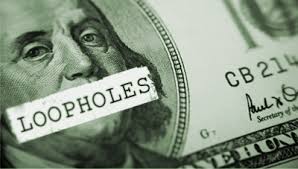“Do the crime, do the time,” the old saying goes. Unless, of course, the criminals are corporate executives. In those cases, the culprits are practically always given a “Get out of jail free” card.
Even the corporate crimes that produce horrible injuries, illnesses, death, massive pollution, consumer ripoffs, etc. are routinely settled by fines and payoffs from the corporate treasury, with no punishment of the honchos who oversee what amount to crime-for-profit syndicates. The only bit of justice in these money settlements is that some of them have become quite large, with multibillion-dollar “punitive damages” meant to deter the perpetrators from doing it again. Yet the same bad corporate actors seem to keep at it.
What’s going on here is a game of winkin’ ‘n’ noddin’, in which corporate criminals know that those headline-grabbing assessments for damages they’ve caused have a secret escape hatch built into them. Congress has generously written the law so corporations can deduct much of their punitive payments from their income taxes! As Sen. Pat Leahy points out, “This tax loophole allows corporations to wreak havoc and then write it off as a cost of doing business.”
For example, oil giant BP certainly wreaked havoc with its careless oil rig explosion in 2010, killing 11 workers, deeply contaminating the Gulf of Mexico and devastating the livelihoods of millions of people along the Gulf coast. So, BP was socked with a punishing payout topping $42 billion. But — shhhh — 80 percent of that was eligible for a tax deduction, a little fact that’s been effectively covered up by the bosses and politicians.
This crazy quirk in America’s laws to deter corporate crime forces victims to help subsidize criminals. Follow the bouncing ball here: First, a court orders a corporation to pay punitive damages to a victim of its criminal acts; second, the corporate offender pays up, and then merrily subtracts a big chunk of that payment from its income tax, effectively taking money out of our public treasury; third, while the criminal is counting its tax break, the victim is notified that the punitive damage money he or she received from the corporation will be taxed as “regular income;” fourth, that means a big chunk of the victim’s payment goes into the treasury to replenish the public money the corporate villain subtracted.

